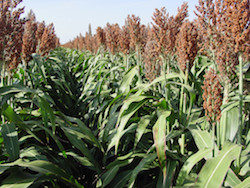The U.S. Department of Energy (DOE) has committed to investing up to $30 million in sorghum research through the Transportation Energy Resources from Renewable Agriculture (TERRA) program. The TERRA program seeks to develop technologies that can increase the precision, accuracy and throughput of energy crops breeding. Doing so, said DOE, will enable more detailed measurements of phenotyping, plant physiology and more sophisticated bioinformatics for gene discovery and trait association.
“This investment is critical for the sorghum industry’s future,” said J.B. Stewart, National Sorghum Producers board chairman. “Producer investments alone cannot move the industry forward. We must have government and private industry investment. We applaud DOE for making such a vital commitment to our rapidly growing industry.”This is one of the largest investments the sorghum industry has seen to date and will have a significant impact on the future of sorghum. A total of six projects were funded through the DOE at universities and research institutions across the nation. The project locations are Clemson University, Purdue University, Texas A&M AgriLife Research and Extension, University of Illinois, Pacific Northwest National Laboratory and the Donald Danforth Plant Science Center.
“This underscore’s something we strongly believe in,” added Clayton Short, renewables committee chair for the United Sorghum Checkoff Program. “Sorghum is a genetically diverse crop ripe for improvement. The DOE realizes this and we are excited to see what additional opportunities this leads too.”
NSP and the Sorghum Checkoff continue to invest in relationships with DOE, private industry and researching universities and will keep members updated as research progresses and results are published.


